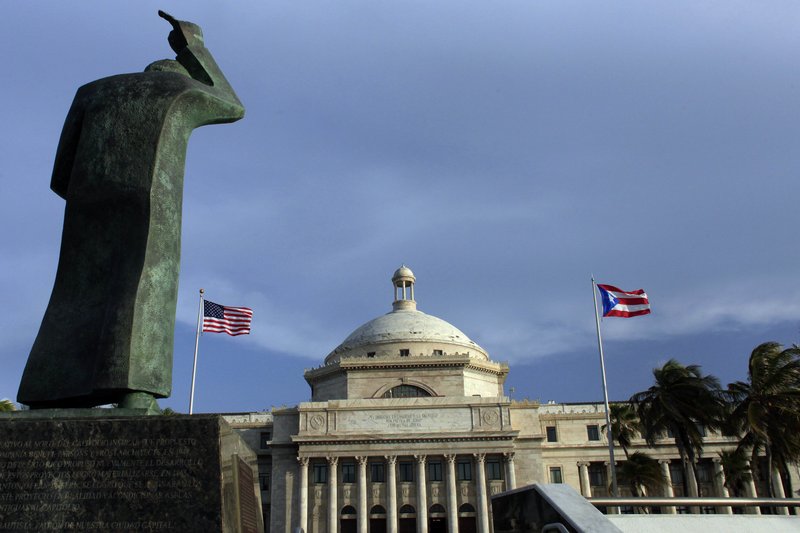SAN JUAN, Puerto Rico -- A federal control board on Friday took over Puerto Rico's finances and several government agencies for the first time in the U.S. territory's history.
The seven-member board met in New York in an attempt to haul the island out of an economic crisis and nearly $70 billion in debt.
Puerto Rico has been mired in a decadelong economic slump brought about largely by heavy borrowing. The island has defaulted on several multimillion-dollar bond payments since last year and faces a growing number of lawsuits from creditors trying to recover a portion of their investments. Several government agencies are operating under a state of emergency that permits withdrawals only for essential public services.
Puerto Rico's economy has shrunk by an estimated 16.5 percent since 2007 and is forecast to contract by 2 percent in the fiscal year ending June 30, according to the island's Planning Board, which calculates economic growth. A record number of Puerto Ricans have left the island to find work on the U.S. mainland.
Friday's meeting was live-streamed over the Internet after pledges that the board would operate with transparency. The meeting was briefly interrupted by about 30 people outside the auditorium of the Alexander Hamilton U.S. Custom House in downtown Manhattan who yelled, "This is slavery!" and "Stop pillaging Puerto Rico!" to protest the role of the panel.
The panel ordered Gov. Alejandro Garcia Padilla to produce a fiscal plan in two weeks and submit weekly and monthly revenue reports that detail how the government is adhering to its budget.
Members also voted on which Puerto Rico government agencies would come under the board's oversight. They include the island's central government, its largest public university, its heavily indebted utility companies, a Government Development Bank that is running out of cash and a public pension system underfunded by more than $40 billion.
"We're working as quickly as possible," said Jose Carrion III, who was elected board president.
The meeting lasted less than 30 minutes.
The board was approved by Congress in June and is responsible in part for helping restructure a portion of a nearly $70 billion public debt that Garcia has said is unpayable. Carrion is one of four Republicans on the board, along with three Democrats. Also on the board is a representative of Puerto Rico's governor who is barred from voting.
Garcia on Thursday urged the board to make the public pension system one of its priorities.
He also requested that the board consider intervening in a trial in which a federal judge is expected to soon rule on whether Puerto Rico will have to pay its debts even though the U.S. legislation signed in June also protects the island from lawsuits through February 2017.
"In this process, we will try to make the board understand that, for the recovery to be real, it must deal with the fiscal aspects, while protecting the economic ones," Garcia said Friday.
Puerto Rico economist Gustavo Velez said the board will likely soon seek help from the capital markets to generate revenue.
"If it doesn't, then it will have to impose severe austerity measures," he said.
"There is no other way to finance the deficit. The government likely will not be able to pay salaries very soon. We're in a downward spiral."
The panel was formed on Aug. 31, as required by the Puerto Rico Oversight, Management, and Economic Stability Act that was signed into law in June.
The law is known as Promesa, or promise in Spanish.
The appointment of Carrion as board president may be a slight positive for current bondholders, said Matt Fabian, a partner at Concord, Mass.-based Municipal Market Analytics, because of the "establishment view" Carrion brings to the board.
"If the board doesn't make deep enough cuts, it makes it more challenging for future lenders to Puerto Rico," said Fabian.
"If they can't cut debt and pensions enough, it creates more of a challenge for the future sustainability of Puerto Rico's finances."
Carrion was raised in San Juan. He graduated with a B.A. from the University of Pennsylvania and received an MBA from the College of Insurance, now St. John's University.
He served as chairman of the Workers Compensation Board in Puerto Rico from 2009-12.
He is the brother-in-law of Commissioner Pedro Pierluisi, who represents Puerto Rico in Congress.
Maria Elan Carrion operates a Puerto Rico-based financial advisory firm that The New York Times said in an April article lobbied for companies that stood to benefit from legislation backed by Pierluisi.
The representative and his wife said there was no conflict of interest.
Information for this article was contributed by Danica Coto of The Associated Press and by Katherine Greifeld of Bloomberg News.
A Section on 10/01/2016
